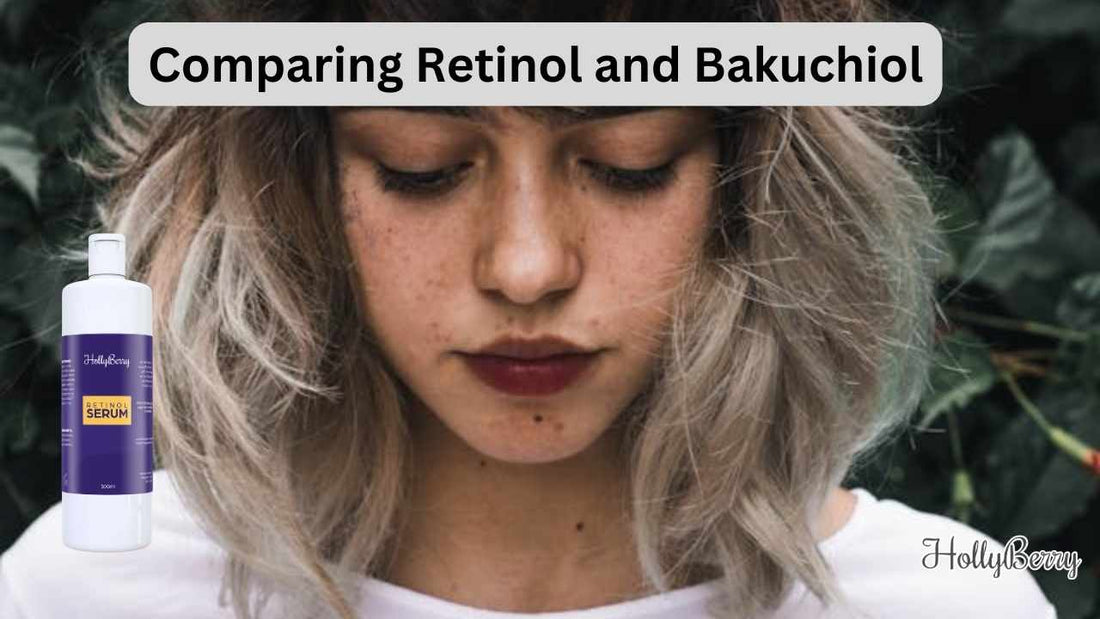
Comparing Retinol and Bakuchiol
Share
Analysing the Benefits for Skin Care

Retinol and bakuchiol are both active ingredients in the skincare world, heralded for their anti-ageing properties.
They are known to address common skin concerns such as wrinkles, loss of elasticity, and uneven skin tone.
Retinol, a derivative of vitamin A, has long been considered the gold standard in anti-ageing skincare due to its well-documented effects on stimulating collagen production and accelerating cell turnover.
However, its potency can sometimes lead to irritation, making it less suitable for those with sensitive skin.
Enter bakuchiol, a plant-based alternative that has gained popularity for its retinol-like effects without the harsh side effects typically associated with retinol use. Extracted from the seeds and leaves of the Psoralea corylifolia plant, bakuchiol has demonstrated an ability to improve skin texture and firmness, and reduce the appearance of fine lines, much like retinol.
Its gentler nature is particularly attractive to those with sensitive skin who may have experienced redness or dryness from traditional retinol products.
Fundamental Properties and Effects
Retinol and bakuchiol are both known for their skin-enhancing effects, yet they each possess distinct chemical properties and mechanisms of action.
This section outlines the fundamental properties and effects of retinol, a derivative of vitamin A, and bakuchiol, a natural alternative, particularly focusing on their roles in skin health and their influence on specific skin functions.
Retinol and Skin Health
Retinol, a form of vitamin A, is celebrated for its ability to stimulate collagen production and promote cell turnover. Its application in skincare aims to improve the skin's overall texture, elasticity, and appearance of fine lines.
Being an active ingredient, retinol converts into retinoic acid upon application to the skin, which is the compound responsible for communicating with cells to enhance skin renewal and collagen production.
However, it can cause sensitivity in some individuals, leading to redness and peeling, especially when first introduced to a skincare regimen.

Get our 500ml Retinol with Hyaluronic acid here
Bakuchiol as a Natural Alternative
On the other hand, bakuchiol, derived from Psoralea corylifolia, has been marked as a gentler, plant-based retinol alternative. Unlike retinol, bakuchiol does not belong to the retinoid family but can mimic the effects of retinol by working on similar pathways to stimulate collagen production and improve skin elasticity.
Featuring notable antioxidant properties, bakuchiol aids in neutralising free radicals, hence contributing to its anti-ageing capabilities. It is well tolerated by most, including those with sensitive skin, and typically does not cause the irritation commonly associated with retinol use.
Considerations for Use in Skincare Routines
When integrating Retinol or Bakuchiol into a skincare regimen, careful consideration of skin concerns, skin type compatibility, and method of incorporation can lead to effective outcomes.
Addressing Skin Concerns
Retinol, a form of Vitamin A, is revered for its ability to diminish the appearance of fine lines, hyperpigmentation, and acne. It promotes skin renewal, aiding in smoother skin texture.
Bakuchiol, derived from the babchi plant, offers similar benefits but is noted for its anti-inflammatory properties and may be less likely to cause skin irritation. Both agents can address visible signs of photoaging but should be complemented with sunscreen due to increased sensitivity to sunlight.
Compatibility with Skin Types
Retinol is potent and may not suit those with sensitive skin types, as it can cause dryness, redness, and irritation. Individuals with rosacea or eczema should use with caution or seek alternatives.
In contrast, Bakuchiol is tolerated better by sensitive skin and may be preferable for individuals prone to irritation. Despite its gentler nature, each user must assess tolerance levels and patch test any new skincare product.
Incorporation and Alternatives in Skincare
Incorporating these actives into a skincare routine requires a strategic approach:
- Retinol: Best used in night routines. Start with lower concentrations and build up frequency.
- Retinol is usually found in serums and creams. It's also not advisable during pregnancy.
- Bakuchiol: Can be used twice daily and is often available in serums and oils.
- Bakuchiol is also suitable for use during pregnancy.
Whether one opts for prescription or over-the-counter products, it's crucial to include ingredients that soothe and moisturise, such as hyaluronic acid or niacinamide, to mitigate potential side effects.
Furthermore, alternation with other actives can prevent over-exfoliation and maintain skin health.
